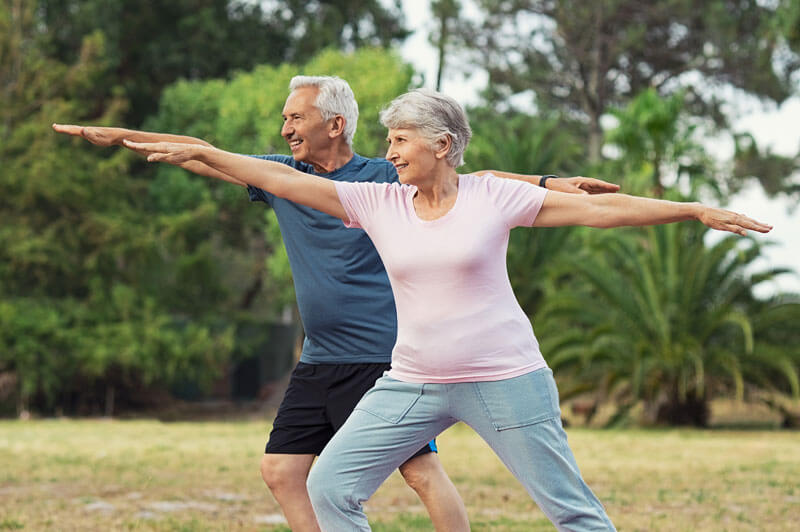Submitted by Ellen Klein
As an editor, Ellen Klein covers topics such as financial management and risk management, as well as health-related topics. She’s a realist and believes that planning for life’s unknowns is best. When she’s not busy with volunteer social work, she can be found scribbling away at her keyboard.

When it comes to staying fit, age is nothing but a number. It doesn’t matter how many candles are on your cake, exercising regularly is important. However, as the body ages, it becomes more vulnerable to things like illness, falls, or cognitive decline. Maintaining an active, healthy lifestyle can keep you feeling young, fresh, and energized well into your senior years.
The Importance of Physical Activity for Older Adults
As we grow older, we tend to adopt a more sedentary approach to life. Energy levels are lower, muscles can feel weaker, and the stamina needed for pushing forward simply isn’t what it used to be. But that doesn’t mean you can’t still stay fit. In fact, it’s all the more reason to keep trying.
Multiple studies have found that physical activity is one of the main contributors to a long life. Regular exercise can increase your quality of life and lengthen it significantly if done consistently over time.
This makes sense because exercise has always been highlighted as a top motivator for brain and body health. Among many things, physical activity keeps the heart strong, stress levels low, improves sleeping habits, and even improves memory. Longevity is the cherry on top.
Therefore, the older you get, the more useful these benefits become. But don’t worry, you don’t need to be a pro to stay fit. There are many easy and effective ways to remain strong for years to come. If you need a little extra incentive, read the following benefits of exercise for seniors.
Reduce Your Chances of Developing Illness or Disease
One of the major benefits of picking up exercise as you get older is the reduced likelihood of disease and illness development. Cancer, for example, is one of the most common and notorious diseases to date, and exercise is one of the most powerful tools for prevention available.
Physical activity promotes blood flow, heart health, and hormone regulation, all of which are crucial for fighting back against free radicals and keeping the immune system healthy. If you have a history of illness or would like to do what you can to prevent it from occurring, exercise is one of your best bets.
Gives You a Sense of Productivity and Purpose
Many older adults report feelings of listlessness and apathy as they age, especially after retirement. Picking up a new skill or hobby can counterbalance these feelings, inviting people to experience the joy of learning and accomplishing healthy goals.
Exercise can add much-needed structure, routine, and healthy spurts of dopamine to your weekly schedule. As you age, finding activities that bring you satisfaction and purpose become integral to everyday life, and exercise is one that can bring both of those things, and more.
Prevent Falls with Improved Mobility and Balance
As you get older, putting plans into place for injury prevention becomes extremely important. Regular physical exercise can help your body regain a sense of balance and flexibility, dramatically reducing the risk of an accidental fall that results in injury.
Gentle physical exercises such as stretching, yoga, Pilates, and swimming can support the body in muscle development and provide you with the central stability necessary for resisting potential damage.
Use It as an Opportunity to Make Friends
The social benefits of exercise are certainly a major benefit too. Many older adults may start to feel isolated or lonely when living in retirement, but having regular group exercises to look forward to can change that.
In this phase of your life, it’s important to reach out to your community and bond with others who are sharing this unique experience called aging. Exercise is a great incentive for leaving the house and seeing friends, even if it’s just for a walk in the park.
More Control Over Weight
The average metabolism naturally slows down with age, which can lead to fluctuations in body weight. Exercise helps to regulate the digestive system and build up muscle mass, affording you more control over weight gain, loss, or preferred dietary habits.
Physical activity also burns calories, which can be useful if your aim is to shift weight. However, even if you are trying to gain healthy weight, exercise is still necessary for its many metabolic benefits.
Fend Off Depression and Anxiety
Over the past few years, there has been a steady increase in the rates of depression and anxiety found in older adults. While some might say this is due to the dramatic isolation brought about by Covid-19, the connection between aging and poor mental health has been prevalent for some time.
Fortunately, frequent exercise is one of the things anyone of any age can do to fight back against mental illnesses, like depression or anxiety. It releases essential feel-good hormones (such as serotonin, norepinephrine, and oxytocin), distracts from negative thoughts, and builds self-esteem.
Improves Cognitive Function
Cognitive decline is a natural part of growing older. However, unless there is a strong genetic inclination, you can deal with this aspect of aging in practical, healthy ways—and one of them is exercise.
Studies have shown regular physical activity can significantly lower the risk of dementia and other cognitive or memory-affected mental diseases. The main reason for this is the increased supply of red blood cells to the brain, which promotes improved neurological speed, accuracy, and longevity.
Good Sleep, Good Life
The more often you exercise, the better (and longer) you will sleep at night. Most older adults need between 7 to 8 hours of sleep each night, and even gentle exercise can help to facilitate that. Age often brings with it an increase in sleep disorders and disrupted sleep patterns, but exercise can help to reduce or alleviate this.
Studies have found that consistent exercise is one of the most effective ways to induce healthy sleeping habits, regardless of age. When your body has been active, it becomes extra tired, affording you a more refreshing and energy-replenishing sleep.
All in all, exercise is something that everyone should aim to engage in—not just older adults. It is just one of the many keys to unlocking a long, healthy, and satisfying life.
Visit our center calendars for classes and activities in your area.


